rusia moviles alquileres madrid alquileres barcelona
"Search Engine Journal" - 4 new articles
- Local Marketing with Hyperlocal Blog and News Aggregators
- SEO Wins & Sins: 5 Questions with Industry Leader Joe Laratro
- Interview with Geno Prussakov, Outstanding Affiliate Marketing Expert
- 3 Ways to Find Tweets Around Any Domain
- More Recent Articles
- Search Search Engine Journal
Local Marketing with Hyperlocal Blog and News Aggregators
Last year I did a short post on building links via local blogs. Looking back at that post I think it is quite limited. Those resources are so much more than just link building tools.
Learning to find and build contacts with local journalists and bloggers will benefit you in plenty of ways (yes, it may take quite some time but it is well worth it in the long run).
What should I do with these resources?
- (If you are a local blogger or a local journalist) Subscribe to each of them to make sure you cover all major events in the area;
- (If you are a local blogger) Submit or claim your listing there to increase your content distribution, visibility, and traffic;
- (If you are the owner of a local business) Track news and build connections with local bloggers to get covered by them (run contests, sponsorships, promote your events, etc);
- (If you are a link builder) Connect to local bloggers to get links when you need them,
- etc
Tool Sources of local information How to track local updates How to promote your local resource Reach Placeblogger Blogs Register to add places and blogs to favorites Submit your local blog here Universal Outside.in Blogs, news resources Subscribe by RSS (bottom of the page) Register your site with Outside.in for Bloggers Universal Patch Local media Register to follow events, subscribe by RSS feed Apply as a local editor here; Add your events here US: New Jersey, Connecticut, New York Every Block government Web sites, blogs, local media iPhone app, email alerts, RRS feed To get covered or included, contact the team feedback at everyblock.com US: Atlanta,
Boston,
Charlotte,
Chicago,
Dallas,
Detroit,
Houston,
Los Angeles,
Miami,
New York
Philadelphia,
San Francisco,
San Jose,
Seattle,
Washington, DC"Local" Twitter search Microblogs RSS feed Follow and make friends with local influencers on Twitter Universal (Below are some details on each one)
1. Placeblogger
A placeblog is a blog about the lived experience of a place. What do we mean by "lived experience"? The "lived experience" can be the local political news of a place, the social news of a place, the arts news of a place, etc. So, placeblogs are often about political issues, community news, restaurant reviews, music scenes, architecture, visual arts, etc. Any aspect of life in a place that makes it different from other places, or information that tells you something about the lifestyle of the place.
This is one of the most effective media to find plenty of local bloggers. For each place you'll see:
- The list of local photos (from Flickr);
- Recently submitted Placeblogs;
- Most popular Placeblogs;
- Recently added posts aggregated from blogs in the database;
- Site users that currently live, used to live or plan to live in the area.
2. Outside.in
Outside.in is a hyperlocal news platform… Hyperlocal means news and information on a more granular level than traditional media provides. Previously, most "local" sites didn't actually get more, well, local than cities or towns. They assumed that just because you live in a specific city or town you are looking for the same news as everyone else. Hyperlocal content gives you the news and information for the area right around where you are, like the block around your office or the neighborhood where you live.
For any combined search query (place + keyword) Outside.in will display the list of aggregated blog posts linking to the actual post on the site (unlike Placeblogger, that redirects to the blog profile on the site):
3. Patch
Visit Patch to keep up with news, businesses, and events, check out photos and videos from around town, see what neighbors are up to, and get in on the conversation.
- Email each author of the article right from within the Patch;
- Browse various directories and categories (events, announcements, school news, local facts, etc);
4. EveryBlock
EveryBlock is a local news Web site with a twist: it offers news down to the block level. Enter any address in one of the supported cities, and you'll see news articles, blog coverage, crime reports and a wide variety of other local information, all updated throughout the day.
- See news distribution (which blocks are more actively covered in the news);
- For any local news see the list of sources (left-hand panel);
- Search through each city press releases (be neighborhood or by zip code), etc:
5. Twitter Search
There is no way to stay properly updated on local news without keeping an eye on Twitter. You can do that via tools like NearbyTweets or ChirpCity but I prefer using Twitter search.
With it you have to options:
- By keyword: just type "City name" or use a hashtag #cityname and watch what is being said about the city;
- By help of NEAR: operator (easily accessed via the advanced search).
Check out the SEO Tools guide at Search Engine Journal.
Local Marketing with Hyperlocal Blog and News Aggregators
SEO Wins & Sins: 5 Questions with Industry Leader Joe Laratro
Effective search engine optimization is equal parts art, science, and EXPERIENCE, so I sat down with industry veteran Joe Laratro to get the dish on what matters most in SEO. Joe is a recognized and leading expert in the Search Engine Marketing industry, and regularly speaks at industry events like Webmaster World, SMX, and Search Engine Strategies. He sits on the advisory board and is the lead moderator and speaker for PubCon.
1. What are the most common mistakes newbie SEOs make?
Search Engine Optimization has changed over the years. I would say there are three distinct generations of SEOers: the meta taggers, the link builders, and the social media marketers. I have seen newbie SEOs try to choose one path for optimization. For long term success all areas and disciplines of Search Engine Optimization need to be addressed and made part of the ongoing strategy.
Another newbie mistake involves trying old and dated spam tactics. I do quite a bit of teaching for the Industry. I am always surprised when someone hints at cloaking, or using white on white text. When I think about it, where is the history book on SEO? Newbie's need a resource of what not to do and how to learn from the mistakes of Webmasters / Marketers / SEOers of the past.
2. On the flipside, are there common mistakes that experienced SEOs still make?
I think to some extent experienced SEOs can make the same mistakes as my first point in question one. We cannot pigeonhole ourselves into only doing one type of SEO. Site architecture, optimized growing content, and natural link building are essential for success. I have seen SEOs that just focus on one area. If we look at link building, it is possible to rank for keywords without ever optimizing the main site. But will that cover the hundreds if not thousands of keyword variations that might drive traffic to that Web site? No.
Benchmarking, analytics, and tracking SEO changes are more common problems. Clients come back and ask what SEO accomplished for the Web site? The numbers should be easy to prove – increasing search referrals and increased number of keywords driving those referrals. This has become even more important since Google's announcement in December of 2009 of full time personalized search results.
The last mistake that is fairly common does not happen because of the SEO professional. This problem lies in communication and tracking between marketing departments and technical departments. Unfortunately SEO work gets overwritten without anyone's knowledge. It can be days, weeks, or even months until the issues are identified. Each department claims the other speaks Greek. Finger pointing flies, but the real loser is the Web site. SEO's have to monitor their implementations.
3. What are 3 things marketers can do RIGHT now to improve their organic rankings?
- Have a solid technical infrastructure that is search friendly
- Have an ongoing content development plan to add new and useful content to the Web site
- Have a link building plan in place: target directories, social media sites, and related Web sites
4. What are the 5 most important elements of an effective search optimization practice?
- Write great subject based content – optimize the basics: title, meta description, alt tags, H tags, and links (anchor text)
- Make a link building plan, stick to it, and monitor it's growth (hint – social media sites should be a large part of this strategy)
- Consider the value of internal linking when it comes to keywords and anchor text (navigation and in content links)
- Make sure the Web site is registered with Google Webmaster Tools, Yahoo Site Explorer, and Bing Webmaster Central. Regularly review for issues and new insights.
- Monitor Analytics for keyword performance and trends
5. After implementing an effective search optimization practice, how soon can marketers expect to see changes in the SERPs?
Search Engines have become very adept at listing fresh content. The Search Engine Marketing community used to say wait 90 days to see the results. Some changes can occur much more quickly now. Personalized search also throws a large monkey wrench into seeing changes in the SERPs. I suggest monitoring Analytics for natural search growth and occasionally spot checking positions.
Check out the SEO Tools guide at Search Engine Journal.
SEO Wins & Sins: 5 Questions with Industry Leader Joe Laratro

Interview with Geno Prussakov, Outstanding Affiliate Marketing Expert
I love Twitter for putting me into contact with really outstanding people (well, since I don't have time for conferences, Twitter is my major source of valuable contacts). Today I am happy to feature the interview with one of the marketers who has always been someone I've looked up to.
Geno Prussakov is a well-known affiliate marketing expert, author and contributor to 3 books (including his bestselling "A Practical Guide to Affiliate Marketing") and a number of industry's magazines and journals, international speaker (most frequently appearing at Affiliate Summits), blogger, educator, and award-winning affiliate program manager.
1. Please tell us a few words about yourself. What brought you to the affiliate marketing?
I was born and raised in Eastern Europe — in the southwest of the former Soviet Union, now a country of its own, Moldova. I lived there until the age of 21, which was when I travelled abroad for the first time. The first Western country I travelled to was England. I studied psychology, psychology, modern and classical languages at the University of Oxford, while completing the Master's leg of my 5-year linguistics degree in Moldova. It was a fun time of travelling between two countries, and studying at two universities at the same time.
After that I travelled to the U.S. where I studied counseling psychology for two years. After that, I went to Cambridge (yes, back to England) to get my Master's degree in international relations. At the same time I started my first online business, a Russian gifts and collectibles store. After playing with paid search marketing, banner advertising, and other available types of advertising/marketing I discovered affiliate marketing, and started my first affiliate program. It was initially run on an in-house platform, but in 2004 I moved it to ShareASale (an affiliate network I've worked with for over 6 years already). As that affiliate program developed, I was approached by another merchant who asked me if I would manage their affiliate program too. I agreed.
In 2006 I bade RussianLegacy.com farewell, and turned into a full-time online marketing consultant and affiliate program manager. In 2007 I published my very first book (must of which was based on my own affiliate program management experience), "A Practical Guide to Affiliate Marketing". To date it is one of the bestselling affiliate marketing books out there… At present time I am actively involved in the affiliate marketing industry, working on a doctorate degree along the way.
2. I remember I first got to know you from Abestweb forum. It was like three or four years ago. You were on each and every thread helping people with your answers. Can describe the place? Are you still active there?
ABestWeb.com is by far the largest and most active affiliate marketing forum out there. It brings together affiliate marketers operating across the whole spectrum of the industry: affiliates/publishers, merchants/advertisers, affiliate network reps and owners, in-house and outsourced affiliate program managers, representatives of other vendors and agencies that work in the affiliate marketing channel. It's a busy place, and one that affiliate marketers trust, and come there to voice out their questions, concerns, and share ideas.
Many people that I now call friends were met by me through ABW. At this time I am not as active in that forum as I used to be (too much going on in my life, and I must prioritize), but devote more time to research, blogging, and my writing efforts.
3. When did you start blogging and why?
I wrote my very first blog post on November 18, 2007. Yes, I came to the world of blogging much later than most online marketers out there. Initially, I blogged to keep affiliates posted on the news about the affiliate programs I managed at that time.
With time, and especially after starting my doctorate studies in early 2008, the topics of blog posts changed from broadcasting the news to writing on the practical topics (and issues) that all affiliate marketers can relate to (e.g.: marketing methods to use and "how-tos", best practices for affiliate program managers to adhere to, digital marketing statistics, mobile commerce and marketing, etc).
Today I am a firm believer that any blogger who wants to be really successful at it should forget about broadcasting. It worked a few years back, but no longer. You can't take any more from the online space than what you yourself have contributed.
4. Which niches (in your experience) are more profitable when it comes to make money being an affiliate?
This is a very popular question, and naturally so. My answer to affiliates is always twofold: (i) focus on the niche of (a) your passion and (b) knowledge/expertise, and (ii) pick your partners carefully. While the first point is self-explanatory (don't pretend you know something that you really don't — it'll show), by the second one I mean partnering with affiliate networks and advertisers that have a solid reputation and track record in the industry.
It is also crucial to underscore that "profitable niches" should never be measured by the commission levels that are being paid by advertiser/merchant. Always look at the broader picture. Remember to look at such metrics as conversion, average order value, reversal rate, cookie life. For example, hosting companies have historically had high commission payouts (anywhere from $50 to $150 a sale, with select ones paying as much as $300-400/sale). Sounds attractive, doesn't?
Well, hold your horses before you spend all of your money on those paid search ads, or advertising on other types of properties! Hosting affiliate programs are also known to have some of the highest reversal rates in affiliate marketing history. While many affiliate networks will not disclose this piece of information to you, it is not unusual for a hosting company to reverse between 50% and 80% of all affiliate transactions…
Do your due diligence before you dive into any niche. And once you've made up your mind to focus on something, take it easy, building up on previous successes, and avoiding previously-made mistakes.
5. You've been in the affiliate marketing for ages. Do you consider yourself a pioneer? How did the affiliate marketing evolve since you first got into it?
I came into affiliate marketing some 7 years ago, whereas the industry itself is some 14-15 years old already. I wouldn't call myself a pioneer of the industry; maybe one of the pioneers in systematizing the knowledge, and bridging the gap between traditional management science, principles of leadership and affiliate program management. These are the areas that I've been closely working in for the past few years, making parallels and translations (must be my linguistic background moving me) between theories and theorems of traditional business contexts and digital marketing industry.
Much has changed since I've originally gotten into this industry. Google has become smarter, online consumers have gotten shaper and pickier, Social Media evolved, mobile marketing is quickly gaining power, FTC and federal governments around the world have acknowledged digital marketing (and affiliate marketing in particular) as an integral part of strategies that businesses now use, affiliate marketing professional organizations have evolved… I see all of these as positive trends. We're getting more organized, while the market is pointing us towards the path of ongoing education and improvement; and this means we're growing.
6. Social media changed the world of SEO dramatically. Is it the same with affiliate marketing? How do you leverage social media?
Yes, social media is definitely changing the world of affiliate marketing too. Numerous affiliates are actively utilizing Twitter, Facebook and other platforms to engage consumers. The ones that are using more creative approaches succeed. Be it something as basic as a Facebook game or comparison shopping app, or as advanced as a social shopping network, affiliates that develop something that really adds value leverage any new trend better than the rest of the crowd.
7. Do you remember the best (affiliate marketing related) advice someone has ever given to you?
The best advice I have ever received, and one that I keep on going back to (on a daily basis) comes from a quote that belongs to Henri-Frédéric Amiel, a Swiss poet and philosopher. I have it hanging over my desk.
Amiel wrote: "Work while you have the light. You are responsible for the talent that has been entrusted to you." Any time laziness, which I believe to be one of the most widely-spread obstacles, comes through, I re-read these lines. Talent doesn't have to be of worldwide significance. Do what you do best, and do it passionately and self-sacrificingly. It'll pay off.
8. What are the best places for the newbie to learn affiliate marketing?
Forums (like the www.ABestWeb.com that we've mentioned), blogs (on a daily basis I personally read www.AffiliateTip.com, www.AffiliateAdvocacy.com, www.AffBook.com, www.ReveNews.com, and follow a number of other industry-specific blogs), podcasts (most of affiliate marketing ones can be found at www.GeekCast.fm), and certainly books and resources on other related fields. Affiliate marketing — especially when it comes to the marketing part — does not exist separately from the rest of digital marketing. It is closely intertwined with search marketing, web development, web analytics and CRO (conversion rate optimization), and is dependent on all the online marketing trends that shape the broader digital market (including mobile).
Therefore, you want to be constantly learning, implementing, testing, perfecting, and never give up (even when you burn yourself).
Check out the SEO Tools guide at Search Engine Journal.
Interview with Geno Prussakov, Outstanding Affiliate Marketing Expert
3 Ways to Find Tweets Around Any Domain
I have once shared a few ways to check Twitter comments about any page but what if we need to keep an eye on all Tweets around some domain?
All the three tools listed here have three things in common:
(1) They will list all the aggregated Twitter updates related to the domain (home page + all Tweeted subpages);
(2) They support multiple URL shorteners;
(3) They allow for some ways to subscribe to the generated search results.
1. Topsy
Use SITE: search on Topsy: [site:domain.com] to find:
- Most popular posts from this domain;
- Most popular tweeted images from the domain;
You can filter the results by popularity or timeline; you can also see Tweets from the past month or week.
You can subscribe to the search results RSS to track recent Tweets:
2. Ubervu
Ubervu is a social media analytics tool that has a handy domain search option. Just provide your domain and click through to CONVERSATIONS tab:
It seems to be updated not very often but it offers an email alert option for you to track updates.
You can also click through to PEOPLE tab to see who tweets your domain and through ANALYTICS tab to compare your domain presence on Twitter over time:
3. BackTweets
BackTweets is another tool you need to check out. For [domain.com] search it will list all recent Tweets around any domain and will allow you to subscribe to updates via email or RSS:
Check out the SEO Tools guide at Search Engine Journal.
3 Ways to Find Tweets Around Any Domain
More Recent Articles

Your requested content delivery powered by FeedBlitz, LLC, 9 Thoreau Way, Sudbury, MA 01776, USA. +1.978.776.9498
sábado, 6 de marzo de 2010
Suscribirse a:
Enviar comentarios (Atom)
Seguidores
Archivo del blog
-
▼
2010
(127)
- ► septiembre (7)
-
▼
marzo
(36)
- <!-- AOL_MESSAGE --><!-- Your FeedBlitz Updates ...
- <!-- AOL_MESSAGE --><!-- Your FeedBlitz Updates ...
- <!-- AOL_MESSAGE --><!-- Your FeedBlitz Updates ...
- <!-- Centro de Información WPERU --><!-- ...
- <!-- AOL_MESSAGE --><!-- Your FeedBlitz Updates ...
- <!-- AOL_MESSAGE --><!-- Your FeedBlitz Updates ...
- <!-- AOL_MESSAGE --><!-- Your FeedBlitz Updates ...
- Del iPhone al iPad
- <!-- AOL_MESSAGE --><!-- Your FeedBlitz Updates ...
- <!-- AOL_MESSAGE --><!-- Your FeedBlitz Updates ...
- Best-ever Freeware"
- <!-- AOL_MESSAGE --><!-- Your FeedBlitz Updates ...
- <!-- AOL_MESSAGE --><!-- Your FeedBlitz Updates ...
- <!-- AOL_MESSAGE --><!-- Your FeedBlitz Updates ...
- <!-- Carrero» , Carrero. David Carrero y Jaime C...
- <!-- AOL_MESSAGE --><!-- Your FeedBlitz Updates ...
- <!-- AOL_MESSAGE --><!-- Your FeedBlitz Updates ...
- - 10 new articles
- <!-- AOL_MESSAGE --><!-- Your FeedBlitz Updates ...
- <!-- Carrero» , Carrero. David Carrero y Jaime C...
- <!-- Blog de informatica --><!-- ...
- <!-- AOL_MESSAGE --><!-- Your FeedBlitz Updates ...
- <!-- AOL_MESSAGE --><!-- Your FeedBlitz Updates ...
- <!-- AOL_MESSAGE --><!-- Your FeedBlitz Updates ...
- A Time and Season for Search: How Data Mining Can...
- <!-- Carrero» , Carrero. David Carrero y Jaime C...
- <!-- Carrero» , Carrero. David Carrero y Jaime C...
- <!-- Carrero» , Carrero. David Carrero y Jaime C...
- Watch the 2010 Oscars : Academy Awards Online
- Google Buys Online Collaboration Operator DocVerse
- <!-- AOL_MESSAGE --><!-- Your FeedBlitz Updates ...
- <!-- Carrero» , Carrero. David Carrero y Jaime C...
- <!-- Carrero» , Carrero. David Carrero y Jaime C...
- <!-- AOL_MESSAGE --><!-- Your FeedBlitz Updates ...
- Twitter Newsletter 2010 - Edition #1
- <!-- AOL_MESSAGE --><!-- Your FeedBlitz Updates ...

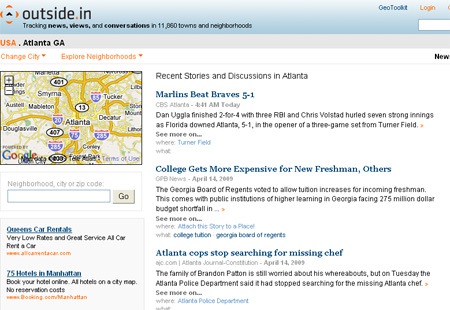

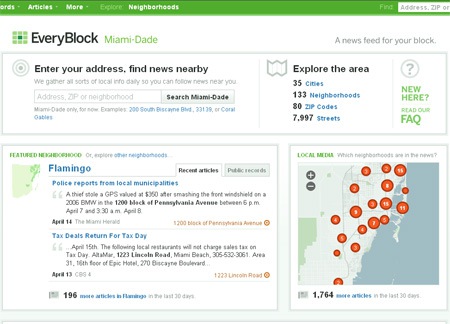
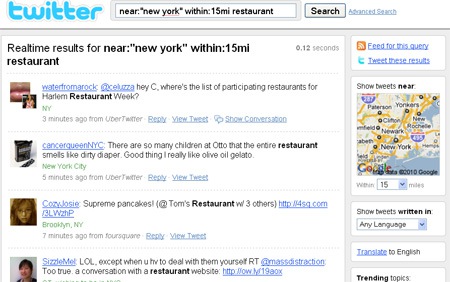



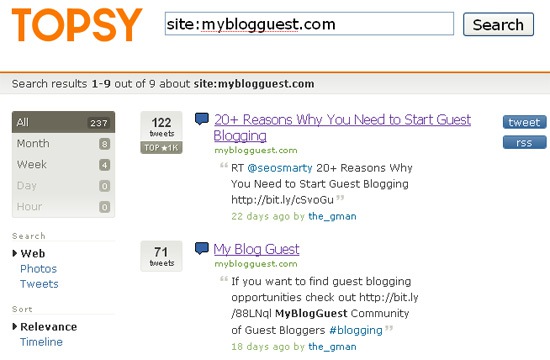
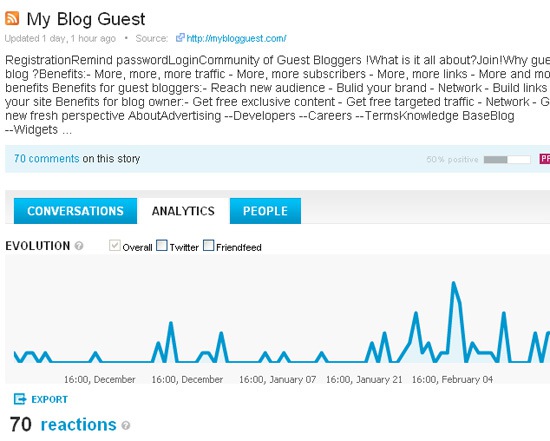


No hay comentarios:
Publicar un comentario